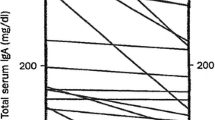Summary
The majority of ankylosing spondylitis AS) patients not only possess HLA-B27, but during active phases of the disease have elevated levels of total serum IgA, suggesting that a microbe from the bowel flora is acting across the gut mucosa.
Biochemical studies have revealed that Klebsiella bacteria, not only possess 2 molecules carrying sequences resembling HLA- B27 but increased quantities of such microbes are found in fecal samples obtained from AS patients and such patients have Crohn’s like lesions in the ileo- caecal regions of the gut. Furthermore AS patients from 10 different countries have been found to have elevated levels of specific antibodies against Klebsiella bacteria. It has been suggested that these Klebsiella microbes, found in the bowel flora, might be the trigger factors in this disease and therefore reduction in the size of the bowel flora could be of benefit in the treatment of AS patients.
Microbes from the bowel flora depend on dietary starch for their growth and therefore a reduction in starch intake might be beneficial in AS patients. A “low starch diet” involving a reduced intake of “bread, potatoes, cakes and pasta” has been devised and tested in healthy control subjects and AS patients. The “low starch diet” leads to a reduction of total serum IgA in both healthy controls as well as patients, and furthermore to a decrease in inflammation and symptoms in the AS patients.
The role of a “low starch diet” in the management of AS requires further evaluation.
Similar content being viewed by others
Reference
Ebringer, A. Theoretical models to explain the association of HLA-B27 with ankylosing spondylitis. Scand J Rheumatol 1990, sup 87, 151–163.
Schwimmbeck, P.L., Yu, D.T.Y., Oldstone, M.B.A. Autoantibodies to HLA-B27 in the sera of HLA-B27 patients with ankylosing spondylitis and Reiter’s syndrome: molecular mimicry with Klebsiella pneumoniae as potential mechanism of autoimmune disease. J Exp Med 1987, 166,173–181.
Fielder, M., Pirt, S.J., Tarpey, I., Wilson, C, Cunningham, P., Ettelaie, C, Binder, A., Bansal, S., Ebringer, A. Molecular mimicry and AS: possible role of a novel sequence in pullulanase of Klebsiella. FEBS Letters 1995, 369, 243–248.
Ebringer, A., Ahmadi, K., Fielder, M., Rashid, T., Tiwana, H., Wilson, C, Collado, A., Tani, Y. Molecular mimicry: the geographical distribution of immune responses to Klebsiella in ankylosing spondylitis and its relevance to therapy. Clin Rheumatol 1995,15(Suppl.l), 57–61.
Ebringer, A. Ankylosing spondylitis is caused by Klebsiella: Evidence from immunogenetic, microbiologic and serologic studies. Rheum Dis Clin N Amer 1992,18,105–121.
Veys, E.M., Van Laere, M. Serum IgG, IgM and IgA levels in ankylosing spondylitis. Ann Rheum Dis 1977, 32, 493–496.
Cowling, P., Ebringer, R., Ebringer, A. Association of inflammation with raised serum IgA in ankylosing spondylitis. Ann Rheum Dis 1980, 39, 545–549.
Cowling, P., Ebringer, R., Cawdell, D., Ishii, M., Ebringer, A. C-reactive protein, ESR and klebsiella in ankylosing spondylitis. Ann Rheum Dis 1980, 39, 45–49.
Mielants, H., Veys, E.M., Cuvelier, C, De Vos, M. Ileocolono-scopic findings in seronegative spondyloarthropathies. Brit J Rheum 1988, 27(Sup. 2), 95–105.
Finegold, S.M., Sutter, V.L., Sugihara, P.T., Elder, H.A., Lehmann, S.M., Philips, R.L. Fecal microbial flora in Seventh Day Adventist populations and control subjects. Amer J Clin Nut 1977, 30, 1781–1792.
Deschamps, A.M., Richard, C, Lebeault, J.M. Bacteriology and nutrition of environmental strains in Klebsiella pneumoniae involved in wood and bark decay. Ann Microbiol (Inst Past) 1983, 134A, 189–196.
Ebringer, A., Baines, M., Childerstone, M., Ghuloom, M., Ptaszynska, T. Etiopathogenesis of ankylosing spondylitis and the crosstolerance hypothesis. Adv Inflam Res 1985, 9,101–128.
McNeil, N.I., Bingham, S., Cole, T.J., Grant, A.M., Cummings, J.H. Diet and health of people with an ileostomy. 2. Ileostomy function and nutritional state. Brit J Nut 1982, 47, 407–415.
Anderson, I.H., Levine, A.S., Levitt, M.D. Incomplete absorption of carbohydrate in all-purpose wheat flour. New Engl J Med 1981, 304, 891–892.
Nissila, M., Lahesmaa, R., Leirisalo, M., Lehtinen, K., Toivanen, P., Granfors, K. Antibodies to Klebsiella, E.coli and Proteus in ankylosing spondylitis: Effect of sulfasalazine treatment. J Rheumatol 1994, 21, 2082–2087.
Author information
Authors and Affiliations
Rights and permissions
About this article
Cite this article
Ebringer, A., Wilson, C. The Use of a Low Starch Diet in the Treatment of Patients Suffering from Ankylosing Spondylitis. Clin Rheumatol 15 (Suppl 1), 62–66 (1996). https://doi.org/10.1007/BF03342649
Published:
Issue Date:
DOI: https://doi.org/10.1007/BF03342649




